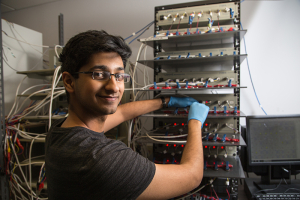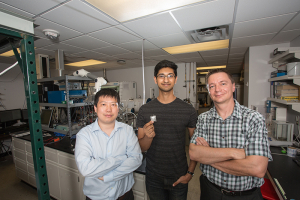Karun Kumar Rao, a first-year chemical engineering doctoral student in the UH Cullen College of Engineering, has been offered a place in the esteemed NASA Space Technology Research Fellowship (NSTRF) program for his research on solid-state batteries.
Standard lithium-ion batteries, which power much of the modern world, are composed of two solid layers, called electrodes, separated by a membrane infused with a liquid or gel electrolyte. Recent research has explored replacing the potentially flammable liquid layer in these batteries with a solid electrolyte, which can increase the safety and energy storage density of the batteries.
But several challenges remain before all-solid-state batteries can takeover their lithium-ion counterparts. As a NASA Space Technology Research Fellow, Rao will further develop computational methods used in chemistry and material science to build a fundamental understanding of solid-state batteries and verify the simulations experimentally. NASA is particularly interested in Rao’s research because it may yield safer, lighter and more temperature resistant batteries, which can eventually be used in space exploration.
“We want to take materials that we know work and apply computational models to understand their properties at an atomic level,” said Rao. “Once we know how those materials work, can we design better ones for these batteries.”
With NSTRF, NASA sponsors U.S. citizen and permanent resident graduate students who show significant potential to contribute to NASA’s goal of creating innovative new space technologies for the nation’s science, exploration and economic future. Each student will be matched with a technically relevant and community-engaged researcher, usually at a NASA Center, who will serve as the student’s professional research collaborator. The research collaborator will serve as the conduit into the larger technical community corresponding to the student’s research interests.
The fellowship spans the 2017-2018 academic year with the potential of a three-year extension. Fellows have the opportunity to spend 10 weeks each year researching at a NASA facility or center and are given a travel budget to attend conferences.
“I was extremely excited to hear I was accepted into this program,” said Rao. “NASA’s work has impacted so many people in so many ways, and to be able to both contribute to, and learn from that, is an amazing opportunity.”
Rao is co-advised by electrical and computer engineering assistant professor Yan Yao and chemical and biomolecular engineering assistant professor Lars Grabow, both of whom he impressed with the quality of his research and character.
“I am not surprised that he was offered this fellowship,” said Yao. “Karun is an extremely gifted student whose research in solid-state batteries and how they can be improved for space applications is of special interest to NASA.”
Grabow, equally impressed with Rao’s research, added that his self-starter attitude sets him apart from the crowd.
“Karun is incredibly independent. He identified Yan and I and approached us with his own project idea,” added Grabow. “He has used his creativity, his imagination and his independent thinking in preparing the NASA fellowship proposal. His motivation and initiative is rather remarkable and something I haven’t seen with many students.”
When asked about what he hopes to learn during his fellowship, Rao explained, “NASA researchers have expertise in a wide range of fields, from fundamental electrochemistry to manufacturing principles and techniques. I am eager to learn from them, and can’t wait to work with so many different amazing researchers and laboratories.”

